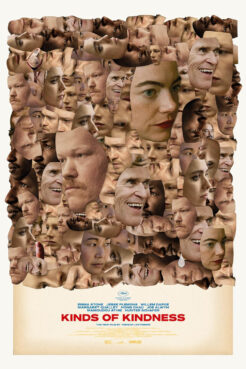(RNS) — This week saw the release of the new film “Kinds of Kindness,” starring Emma Stone, Jesse Plemons and Willem Dafoe and directed by Yorgos Lanthimos. The film is really a series of three loosely connected stories, each with separate credits scenes, told over the course of nearly three hours. Dubbed a “black comedy,” violence and sex fill the nearly three hours of run time, but the real beauty of this film is in the way it lays bare the human condition. We all want to be loved and accepted, and human beings are willing to go to astonishing lengths to make that happen.
In the first story, we follow Robert Fletcher, a man whose entire existence is determined by his boss. What he eats and drinks, who he marries, what he wears and whether or not he is permitted to have children are all determined by the man in a corner office to whom he must submit daily reports. It is an arrangement that he has followed meticulously for 10 years, but one day, Fletcher decides that a particular request has gone too far, and he refuses. What follows is the agonizing tug and pull of someone who desperately needs approval and his life back, but who knows this request will forever change him as a person.
In the next episode, we follow a police officer named Daniel whose performance at work is slipping because his wife, Liz, is missing. Eventually, she returns, but all cannot be so easily put back together the way it was, and Daniel begins to suspect that the person who is in his house is not his wife at all. Whether he is in the middle of a psychotic episode or is a virtuous truth teller is in the eye of the beholder, but at the core of it, Daniel is a figure who just desperately wants his wife and life back, and that desire begins to tear him apart.
In the final edition of this triptych, Emily and Andrew play cult members who are hunting for a messiah-like figure with mystical powers. Eventually, Emily winds up in disfavor with the cult, but continues on the mission in an attempt to win the love of the charismatic cult leaders, a couple who cry into a vat of water that all their devotees must drink from. A particular manic energy follows Emily, as she skids into parking spaces in a muscle car in search of the chosen one. The beating heart of this story, though, is the family she was willing to give up to win the acceptance of the cult.
If you want to try to understand this movie, which I’m not sure I recommend, honestly (one fellow moviegoer at my screening exclaimed at the end of the film, “I have no idea what that was about, but I liked it”), the movie’s opening sequence gives a worthwhile clue, with the song “Sweet Dreams (Are Made of This)” playing in the background as a blue BMW pulls into a mansion:
Sweet dreams are made of this
Who am I to disagree?
I’ve traveled the world and the seven seas
Everybody’s lookin’ for somethingSome of them want to use you
Some of them want to get used by you
Some of them want to abuse you
Some of them want to be abused

Film poster for “Kinds of Kindness.” (Image courtesy Searchlight Pictures)
Everybody in these stories is looking for something, and everyone in these tales is also dealing with the forces of domination, control and confusion that result from that basic human desire to be accepted. In one sequence Fletcher’s boss asks him: “Do you love me? If you loved me, you’d do it.” Love and control go hand in hand in this movie.
The gist of the film seems to be this — we are made for devotion, but what it does to us is hard to watch. Religion is only explicitly named in the last story, which focuses on a cult, but in the film’s exploration of what devotion does to a person, there are elements of faith everywhere.
I wish I could say religious outlets for that desire are safe, but that is far from the truth. Religion is perhaps uniquely capable of satisfying an innate human craving for community, and because of that, it can far too often serve as a cover for abuse, control and oppression.
We live in a world with an extraordinary amount of suffering, and “Kinds of Kindness” pays ample attention to that. We see glimmers of the beauty of what it means to be human in this film, too — people weighing the moral injury of an action and rejecting it no matter the cost, men who care for each other and are vulnerable in their friendship, and a faith in the unseen that is rewarded — but in almost every instance, these sparks of light are quickly snuffed out. That, too, is part of what it means to be human.
At the end of the day, it is what we do with the darkness and pain that matters.
(The Rev. Michael Woolf, Th.D., is senior minister of Lake Street Church of Evanston, Illinois, and co-associate regional minister for white and multicultural churches at the American Baptist Churches of Metro Chicago. He is the author of “Sanctuary and Subjectivity: Thinking Theologically About Whiteness in Sanctuary Movements.” The views expressed in this commentary do not necessarily reflect those of Religion News Service.)















